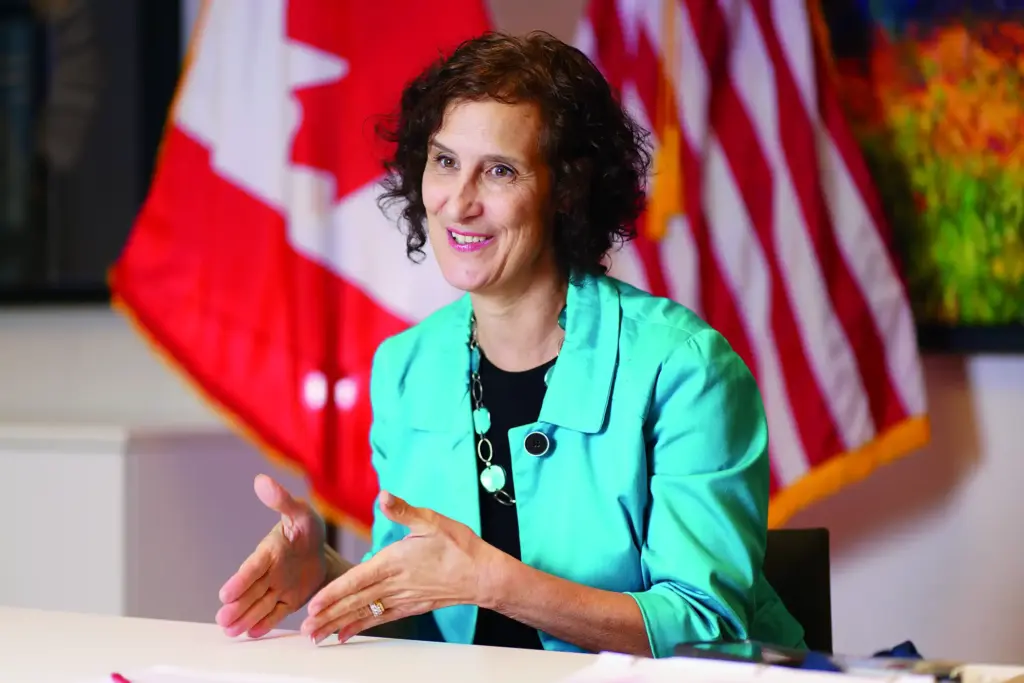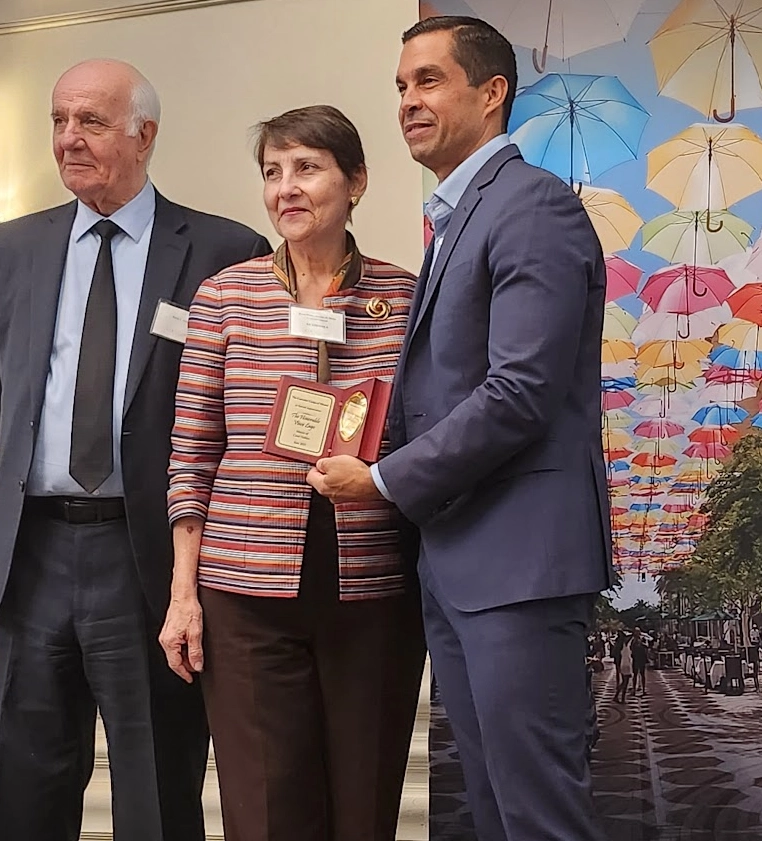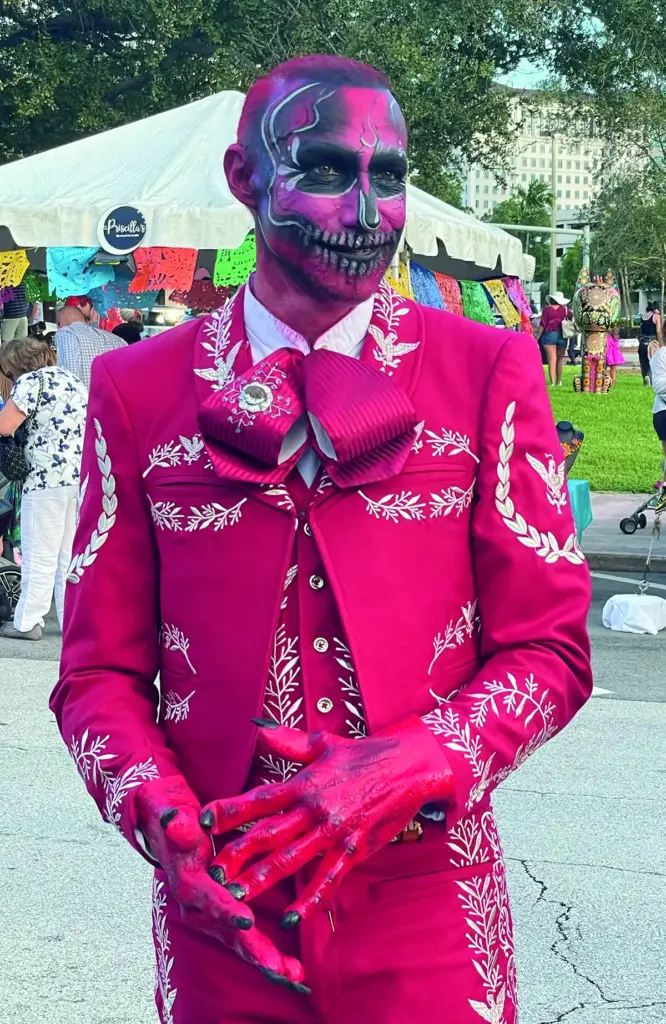Inside the Commercial Power of the Consular Corps
The Miami Consular Corps: A Special Report on the Diplomatic & Trade Representatives Who Connect Miami with the Globe.
Sponsored by
By Cami Hofstadter
When Chris Hodgkins, CEO of the Miami Access Tunnel Concessionaire, speaks of the successful Port of Miami tunnel project he waxes exuber- ant about former French Consul General Gaël de Maisonneuve. “He came to every single event related to the project, showing all the support he could by his presence alone,” says Hodgkins. “He even came to the Miami Outboard Club for our first celebration of St. Patrick’s Day, and after that our members just couldn’t stop talking about him. That’s the kind of foreign consul he was.”
Another person who likes to vouch for the success of connecting the dots between in- person actions and the conclusion of a major commercial project is a former honorary consul from Finland. When Port Everglades put out bids for its second gantry crane – at 30 long-ton, considered a giant at the time – the Finnish Kone corporation relied on the local consul to be at the Broward Commission hearings. Baffled by the appearance of this foreign official – the only consul in attendance, who proceeded to speak about the merits of doing business with a country enjoying a stellar reputation around the world – commissioners surprised everyone by halting the bidding process. Voicing their strong objections over this turn of events, the other foreign manufacturers walked out of the hearing room while the Finnish consul lingered to shake hands with each commissioner. Later, when the $3.5M contract was finally awarded to Kone Oy, one of the port representatives was overheard saying, “The Finns really knew how to work that diplomatic angle.”
Not every project can be funneled through a local consulate. The current Deputy Consul General of Germany, Klaus Bormann, shares that his office isn’t equipped to handle all commercial inquiries. Many are routinely referred to the German-American Chamber of Commerce in Atlanta because it is a government-sponsored agency with the needed resources, whereas the Miami chapter of the chamber is a private agency. On the other hand, a Commercial Attaché at the Turkish Consulate works closely with Consul General Feyza Barutcu-Altug, whose previous post was as Head of the Department for Maritime Affairs in the Foreign Ministry. A priority for both is to bring the cruise industry back to Turkey, though a plethora of other commercial projects also occupy their time.

It’s no surprise that one of our major trading partners – Canada – has consular offices headed by Consul General Sylvia Cesaretto, with an unusually large, dedicated staff for trade matters led by Jean-Pierre Hamel, with the title of Sr. Trade Commissioner and Consul.
But don’t believe you can just walk in with a vague idea of talking with “someone” about some indeterminate project you have in mind in Canada. As a former consul general said to this writer, “We expect you to do your homework first” – a common sentiment among all consuls who combine their duties with trade-related matters.
Nations that follow the model of having a commercial attaché or trade officer (titles often vary) are hard to pinpoint by members of a needy or curious public. Almost none of the countries (more than eighty) with consulates in Miami include information in the Directory of the Consular Corps about staff dedicated to trade matters. One exception is the Vice Consulate of Hungary, which comes with an Economic Attaché, Aniko Kubatov.

AN INEXACT SCIENCE
Ever since the first foreign consul (from France) was accredited in 1778 in the newly independent nation of the United States (it would take the individual states much longer to get on the new consular bandwagon) absolute exactness of status alludes most of us today. The only official source confirming the accreditation of foreign consular officials is the U.S. State Department through its regional Office of Foreign Missions (OFM).
But since the OFM doesn’t keep a separate record of trade officers – only if they are also recognized as consuls – the business community usually relies on more easily available information, accurate or not. The result is confusion about when a trade inquiry should be directed to a consulate or to one of the dozen or so facilities outside that office. The fact that some of them are named a “trade center” (Malaysia, Taiwan, and Thailand) with others using “trade commission” (Italy and Spain) or versions of “investment promotion” or “export,” doesn’t generally help people seeking their assistance.
Even when a foreign consulate isn’t expected to involve itself with business transactions involving private enterprises from the nation it represents, consuls will often publicize their products or services. For instance, Ken Okaniwa, a former Consul General of Japan in Miami, used a local newspaper to tout the new fleet of Metrorail cars built locally by Japanese firm Hitashi, while opining that efficient mass transit should be part of the overall health of any metropolitan area.
Then there’s the special case of the Republic of China (Taiwan) with its active local
representation through what’s called the Taipei Economic and Cultural Office. Because the
United States doesn’t have diplomatic relations with Taiwan, the head of the Miami office –
Charles Chou – cannot be accredited as a consul. Instead, his position comes with the title
Director General.
Ever since U.S. President Coolidge said that “The business of America is business,” it’s often been said that commercial events occupy a major portion of what a consulate does, not just in Miami but in communities throughout the fifty states. So, is there any way the impact of these foreign officials on Miami can truly be determined?
For an answer, we look to functions traditionally considered “consular” in international law and custom. We know that the representatives from ninety-five nations who met in Vienna in 1963 were there to reach an agreement on the role of a foreign consul. The final version of the Vienna Convention’s relevant provision defines consular functions as commercial, economic, cultural, and scientific relations, and any other activities not prohibited by the laws of the receiving country. In this, there’s no distinction between career and honorary consuls.
Specifics about consular functions defined by the convention are much too detailed to outline here, but scholars have long streamlined consular activities into two broad categories: the business-related matters mentioned above and the category of citizen services. With more than 100,000 Germans living in Miami-Dade County, it’s easy to agree with Bormann that performing “consular work” relating to them is on top of his list of priorities – such as renewal of passports and other documentary processes, like guiding non-Americans through a visa application.
One person with her hand on the pulse of the civic and business engine known as the Greater Miami Chamber of Commerce is Liane Ventura, Sr. Vice-President, and Executive Director of Foreign Trade Zone #32. A peerless source of referrals to Chamber interest groups such as the Consular Corps, she’s long observed that a large amount of new foreign business in Miami comes through visitors from abroad who have a sudden idea for a new enterprise, leading them to contact their consulates.

“Often, they’re so focused on a commercial inquiry they don’t even realize they need a visa extension or change of classification, and that their own consulates can’t do any of that,” she says. “We direct them as much as we can to the right resources.”
Miami also allows local consuls to use the Protocol Room at the airport, specifically set up for the purpose of receiving foreign dignitaries such as visiting ambassadors; even royalty has been met there by their local consul. “We’re the only place in the world with this kind of added bonus for our consuls,” she adds with obvious pride.
In close communication with Nabil Achkar, the decades-long, multi-lingual secretary extraordinaire of the Consular Corps, Ventura gets her information on the consuls from the directory the Lebanese native and bank executive maintains. “But information can change daily,” Achkar notes with frustration in his voice. This includes eight countries listed with “vacancies,” though filling these is naturally subject to the usual accreditation process.
Even the OFM, as the ultimate source of consular status, sometimes struggles with the accuracy of current information, particularly as it relates to honorary consuls.

Since it’s no longer U.S. policy to list them separately, those appointed by the nations they represent as honorary consuls general – a classification adopted by the Vienna convention and appearing in S. Florida as well as nationwide – they aren’t distinguished as such in the OFM records.
Adding confusion is that former consuls often remain as Associate Members of the local Consular Corps, although that designation must be based on truthful prior status as determined by the OFM historical records.
CONNECTING TO THE CONSULAR CORPS
To encourage international trade by fostering economic and cultural opportunities, the Florida Department of State hosted a Consular Summit at the Biltmore Hotel in June 2022. The event opened with a cordial welcome by Florida Secretary of State Cord Byrd and Lt. Governor Jeanette Nunez, after which the one-day gathering empowered consuls to interact with economic and commercial movers and shakers through a plethora of panel discussions and private talks over lunch.
Under the banner of “Connected in Business, United in Culture,” consuls were reminded that their influence is felt far beyond commercial activities alone. For instance, Facets of Education was an important panel discussion by the luminaries of our local universities. According to one study, recruitment of foreign students is a significant way to “shore up local economies and businesses.” Education is, after all, a major economic driver; some reports claim that foreign students add billions of dollars to the national economy annually.
At one local public school, both the German and the French consulates closely follow the progress of their individual language programs by ensuring they have material and financial support approved by their respective home governments. Higher education, in particular the University of Miami (UM) and Florida International University (FIU), have long maintained close ties with local consuls in their pursuit of highly qualified undergraduate and graduate students from around the world, as well as faculty with special skills.
At annual luncheons for the Consular Corps, Dr. Julio Frenk, former Mexican Minister of Health and current President of UM, likes to expound on the image of being a global university. At these events, he’s usually accompanied by his wife, Dr. Felicia Knaul, a tenured professor. The couple has a special relationship with the honorary consul of Poland, Blanka Rosenstiel, for her steadfast financial support of the institution and her shared ancestral roots with the First Lady of the university. FIU, on the other hand, takes a more scholarly approach, hosting speakers to address consuls on timely international events.
The impact of local consuls often goes beyond their traditional activities. One example frequently mentioned by civic leaders is Switzerland because of the Basel-based architectural firm Herzog & de Meuron that designed PAMM (the Perez Art Museum of Miami). Meanwhile, it was a botanist from France, Patrick Blanc, who conceived the Museum’s amazing hanging garden. Local contributions and influence may also be based on specific instructions from home governments, or the special interests or talents of the person in the consular position, whether career or honorary. In fact, the latter is often appointed by a foreign government specifically because of some distinctive expertise (like legal, IT, or investment) whereas consuls in career positions with the Foreign Service arm of their native governments may have to seek out locals to meet the needs of a consulate in particular situations.
Then there’s the frequent matter of turning to a local consul to find suitable venues for showcasing the culture of another nation in Miami. Thomas Abreu, the honorary consul of Monaco, said he felt privileged to arrange a recent visit by the Musical Ambassadors of his country, a Boys’ Choir established in 1974 by Grace Kelly’s husband, Prince Rainier, to promote the Principality around the world. “They’ll be making Florida their primary stop in the future, because of the welcome we gave them here,” Abreu said. Then there are local cultural events where consuls general can be of great help, such as last year’s Day of the Dead celebration in front of Coral Gables City Hall, ably assisted by Mexican Consul General Jonathan Chait, who dressed as a devil for the outdoor event.

In the end, it may be the commercial links that are the most effective way for consuls to promote the trade and investment that lead to cultural intercourse. Because the Miami Tunnel project involved business entities from other countries, there were natural connections to local consuls – if not exactly in the nitty-gritty of legal matters (there are, after all, plenty of local law firms with expertise in French and U.S. business law), then in nurturing cross-cultural relationships between all parties. While the “best international standards” were used in the selection of the French construction company Bouygues, the “best equipment” was built in Germany for re-assembly in Florida. “These boring machines had to be transported on a German ship across the Atlantic, so having a cordial connection with local consular officials turned out to be a bonus when it came to understanding risk management,” said Hodgkins as he reiterated once again his conviction that “Person-to-per- son relations do make a difference.”
Today, many out-of-state consuls are taking the concept of building personal relationships even further. “They come to some of our Chamber events even from as far as Texas and California,” Ms. Ventura says. “And it’s all for the camaraderie of the Consular Corps.”












